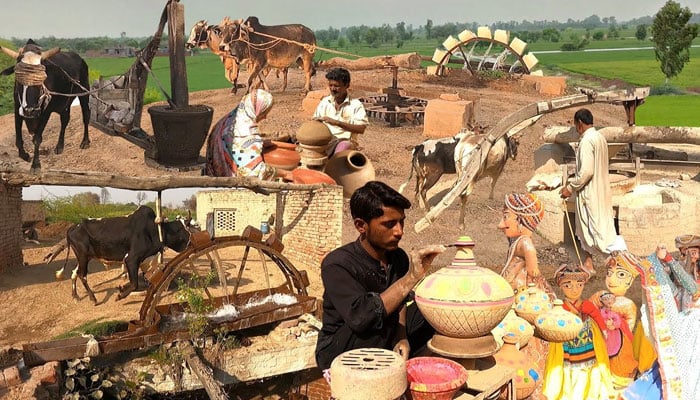Bridging the rural-urban divide
The consequences of this divide are far-reaching, extending beyond economic hardship to encompass social and political instability
Pakistan’s socio-economic landscape is marred by a glaring rural-urban disparity, perpetuated by extractive policies that favor a privileged few. As highlighted in a recent op-ed and corroborated by the UNDP Pakistan National Human Development Report 2020, the divide between the haves and have-nots continues to widen, with powerful elites monopolizing access to opportunities and resources while the majority languishes in poverty.
The statistics paint a stark picture of inequality: the richest one per cent of the population commands a disproportionate share of the national income, controlling vast swathes of income-generating assets such as bank deposits, farmland, and residential property. Meanwhile, the poorest segments of society struggle to make ends meet, deprived of basic necessities like education, healthcare, and decent livelihoods.
This rural-urban dichotomy not only undermines social cohesion but also hampers economic progress. The neglect of rural areas, where the majority of Pakistan's population resides, stifles their potential as engines of growth and innovation. Instead of harnessing the untapped talent and resources of rural communities, extractive policies perpetuate a cycle of poverty and marginalization.
The consequences of this divide are far-reaching, extending beyond economic hardship to encompass social and political instability. The erosion of trust in institutions, exacerbated by perceptions of injustice and inequality, undermines the social contract and fuels resentment and disillusionment among the populace.
To bridge this gaping chasm, concerted efforts are needed to address the root causes of rural-urban disparity and promote inclusive growth. This requires a multifaceted approach that encompasses policy reforms, targeted investments, and community empowerment initiatives.
First and foremost, policymakers must prioritize the development of rural infrastructure, including roads, schools, healthcare facilities, and access to clean water and sanitation. Improved infrastructure not only enhances the quality of life for rural residents but also facilitates economic activity and connectivity with urban centers.
Furthermore, investments in agriculture and rural industries can unlock the potential for job creation and income generation in rural areas. By providing farmers with access to modern farming techniques, credit facilities, and market linkages, we can unleash the productivity of Pakistan's agrarian economy and reduce dependency on subsistence farming.
Education also plays a pivotal role in bridging the rural-urban gap, empowering individuals with the skills and knowledge needed to thrive in the modern economy. Investing in quality education, particularly in rural areas, can equip future generations with the tools to break the cycle of poverty and contribute meaningfully to society.
Healthcare is another critical area that demands attention, with rural communities often lacking access to essential health services. By expanding healthcare infrastructure and implementing preventive healthcare programs, we can improve health outcomes and reduce the burden of disease in rural areas.
Community empowerment initiatives, such as women's economic empowerment programs and youth entrepreneurship schemes, can also play a vital role in bridging the rural-urban divide. By fostering local leadership and ownership of development initiatives, we can ensure that rural communities have a voice in shaping their destinies.
In conclusion, bridging the rural-urban divide is not only a moral imperative but also a strategic imperative for Pakistan's long-term prosperity and stability. By addressing socioeconomic disparities and promoting inclusive growth, we can build a more resilient and equitable society where all citizens have the opportunity to thrive. It is time for bold and decisive action to realize this vision of a more just and prosperous Pakistan.
The writer is a freelance contributor. He can be reached at: allawaljamal2424@gmail.com
-
 ChatGPT Caricature Prompts Are Going Viral. Here’s List You Must Try
ChatGPT Caricature Prompts Are Going Viral. Here’s List You Must Try -
 James Pearce Jr. Arrested In Florida After Alleged Domestic Dispute, Falcons Respond
James Pearce Jr. Arrested In Florida After Alleged Domestic Dispute, Falcons Respond -
 Cavaliers Vs Kings: James Harden Shines Late In Cleveland Debut Win
Cavaliers Vs Kings: James Harden Shines Late In Cleveland Debut Win -
 2026 Winter Olympics Snowboarding: Su Yiming Wins Bronze And Completes Medal Set
2026 Winter Olympics Snowboarding: Su Yiming Wins Bronze And Completes Medal Set -
 Trump Hosts Honduran President Nasry Asfura At Mar-a-Lago To Discuss Trade, Security
Trump Hosts Honduran President Nasry Asfura At Mar-a-Lago To Discuss Trade, Security -
 Cuba-Canada Travel Advisory Raises Concerns As Visitor Numbers Decline
Cuba-Canada Travel Advisory Raises Concerns As Visitor Numbers Decline -
 Anthropic Buys 'Super Bowl' Ads To Slam OpenAI’s ChatGPT Ad Strategy
Anthropic Buys 'Super Bowl' Ads To Slam OpenAI’s ChatGPT Ad Strategy -
 Prevent Cancer With These Simple Lifestyle Changes
Prevent Cancer With These Simple Lifestyle Changes -
 Air Canada Flight Diverted St John's With 368 Passengers After Onboard Incident
Air Canada Flight Diverted St John's With 368 Passengers After Onboard Incident -
 Experts Reveal Keto Diet As Key To Treating Depression
Experts Reveal Keto Diet As Key To Treating Depression -
 Inter Miami Vs Barcelona SC Recap As Messi Shines With Goal And Assist
Inter Miami Vs Barcelona SC Recap As Messi Shines With Goal And Assist -
 David Beckham Pays Tribute To Estranged Son Brooklyn Amid Ongoing Family Rift
David Beckham Pays Tribute To Estranged Son Brooklyn Amid Ongoing Family Rift -
 Jailton Almeida Speaks Out After UFC Controversy And Short Notice Fight Booking
Jailton Almeida Speaks Out After UFC Controversy And Short Notice Fight Booking -
 Extreme Cold Warning Issued As Blizzard Hits Southern Ontario Including Toronto
Extreme Cold Warning Issued As Blizzard Hits Southern Ontario Including Toronto -
 Lana Del Rey Announces New Single Co-written With Husband Jeremy Dufrene
Lana Del Rey Announces New Single Co-written With Husband Jeremy Dufrene -
 Ukraine-Russia Talks Heat Up As Zelenskyy Warns Of US Pressure Before Elections
Ukraine-Russia Talks Heat Up As Zelenskyy Warns Of US Pressure Before Elections




